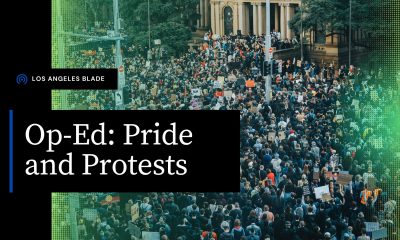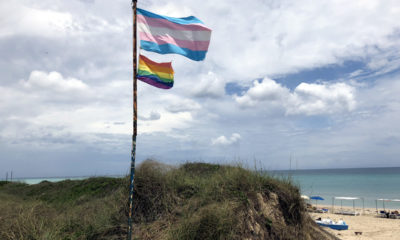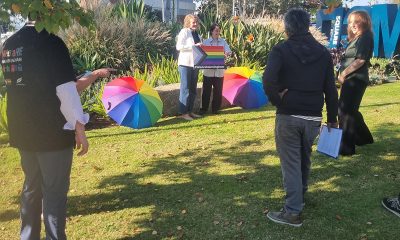homepage news
Lesbian couple from Cuba fights for life together in US
Yanelkys Moreno Agramonte remains in ICE custody, partner free on bond
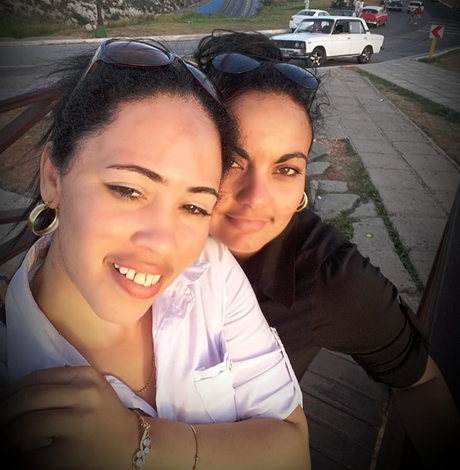
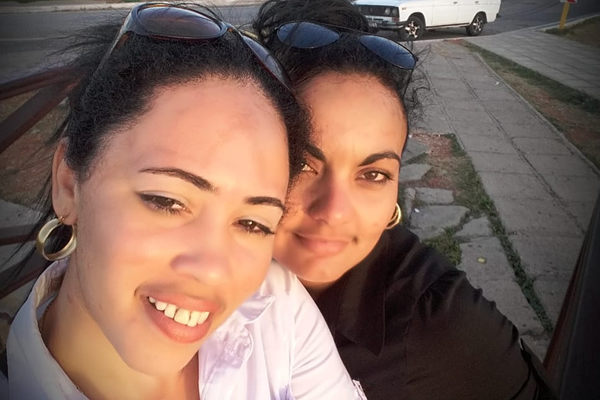
Editor’s note: Yariel Valdés González is a journalist from Cuba who has been granted asylum in the U.S. He spent nearly a year in U.S. Immigration and Customs Enforcement custody until his release from the River Correctional Center in Ferriday, La., on March 4.
Yanelkys Moreno Agramonte, 36, and Dayana Rodríguez González, 31, had never been apart in the nearly five years since they began dating. Their lives were one until Nov. 3, 2019, when they both applied for asylum in the U.S. at a port of entry in El Paso, Texas, and they were separated a short time later.
Moreno and Rodríguez were placed into different cells as their entry into the country was processed.
“They locked me up in a small, lonely place,” Moreno told the Washington Blade on June 9 during a telephone call from the South Louisiana ICE Processing Center in Basile, La., where she remains in U.S. Immigration and Customs Enforcement custody. “I was there for two days and my partner was transferred the day after we arrived.”
“We lost all ties,” Rodríguez told the Blade during a telephone interview from Phoenix on June 10 where she now lives. “I didn’t know where she was and she didn’t know where I was. On the fourth day, they moved me at night to the detention center and there I was, still unsure whether they would send her there.”
The next day, they saw each other for a few minutes in the El Paso Service Processing Center’s dining room, since they were not in the same dorm. Rodríguez and Moreno did whatever they could to see each other.
“They scolded us twice because I was the last one in line in order to wait for her to come and eat together,” recalled Rodríguez.
Both devised a strategy to see each other in the library and even during Catholic Masses held in the El Paso facility.
“Yanelkys made the requests for visits a couple of times and they allowed us to be together only once,” said Rodríguez. “All of the couples were together in the same room, one next to the other. We couldn’t touch each other, just a kiss at the entrance and a kiss at the exit and with an officer watching over us the entire time.”
Perhaps this story would not have been so bitter if the two women had been married because ICE, in theory, allows a married asylum seeker to sponsor their spouse once it grants them “derivative” status. This process allows them to stay together as long as they present a marriage or civil union certificate.
But Moreno and Rodríguez are citizens of Cuba, an island where same-sex marriage is not yet legal. The government’s policies and social attitudes also emphasize discrimination against the LGBTQ community.
Their immigration cases are the same, but Moreno in December was once again separated from Rodríguez. She was sent more than 900 miles east of El Paso to the South Louisiana ICE Correctional Center, where she currently remains in ICE custody. Rodríguez was detained in El Paso until Feb. 4 when she was released on parole and a $7,500 bond.
The two women saw each other for the last time through a door’s glass window, sending their love to each other with signs after a conversation that would define both of their lives forever. Moreno was gone the next morning and the frustration of not being able to say goodbye to her partner is painful to this day.
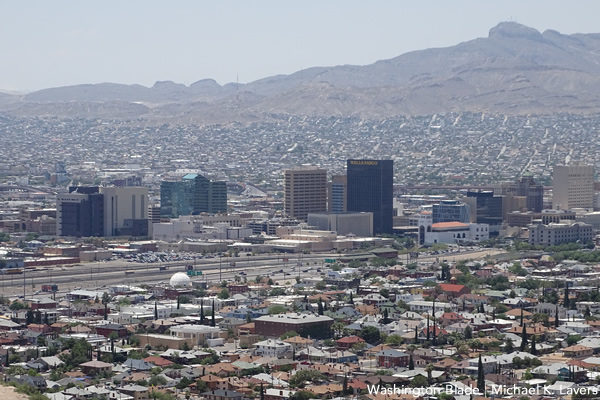
Couple suffered homophobia, police harassment in Cuba
Moreno and Rodríguez’s families never accepted that two women could fall in love and live together. The prejudices that still persist in Cuba and especially in Zulueta, a small town in the center of the country where they lived, were constant hurdles to their social lives and their life together as a couple.
“My parents divorced because of my sexual orientation,” said Moreno. “My father is the typical Cuban man, who said that his children could not be homosexual. My sister was the only one who always supported me.”
Rodríguez was kicked out of her home when her family found out she was in a romantic relationship with another girl.
“They took all of my things from me and that was terrible,” she said. “It was raining and also in the middle of a blackout. I had to collect my things and go to her home. It was something we did not expect.”
Rodríguez’s family’s decision to disown her was compounded by her neighbor’s accusatory looks, so she and her partner did not even dare to hold hands in the street. Moreno told the Blade that such intolerance suffocated her “because there (in Cuba) homosexuals are not well regarded, neither by family, nor by the authorities, we are quite discriminated against. I felt bad because in the end we are also good people. We have rights and the government constantly violates them. We cannot have our own family.”
Because of the impossibility of getting married, gay and lesbian Cubans cannot adopt children.
The current labor law does not protect transgender people, and they can only change their gender and photo on identity documents if they undergo sex-reassignment surgery. Members of Cuba’s National Revolutionary Police have also been accused of targeting LGBTQ Cubans.
Rodríguez in her asylum claim says a police officer constantly followed her and Moreno
“There was an officer named Sosa, who appeared wherever she was,” writes Rodríguez. “He was very rude to us. He insulted us on two occasions by saying that we were not setting a good example for society or children.”
“On the other occasion, we were sitting in the park during some local celebrations, holding hands, without disrespecting anyone and he also came and took us to the police station because, according to him, we could not do that,” continues Rodríguez. “He did not agree that we were a couple or that we showed it in public. He fined us 500 pesos ($20) because he didn’t want to see us together on the street any more. It was like a warning and we were detained for 73 hours. The officer in the police station told everyone that we were lesbians and they also started making fun of us and calling us names. And the truth is that we felt very bad about all that. Life for us was very difficult there.”
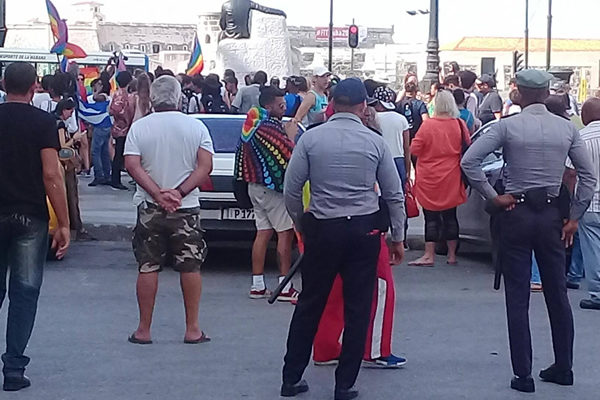
Tired of this familial and societal rejection that Cuban governmental institutions also perpetuate, this young couple exclusively told the Blade they fled the country in order to be able to walk the streets without fear. Now, after seven months in the U.S., they are terrified that Moreno will be deported back to Cuba.
Moreno has already been denied parole twice, which would have allowed her to pursue her asylum case outside of ICE custody.
“ICE’s two responses to my request for parole have told me that I am a flight risk,” said Moreno. “The first was on Jan. 5 and a group of lawyers prepared the second request … it turned out very well, with everything they ask for: A very complete request and they denied me again. They set a date for an interview that they never did.”
ICE’s own directives mandate an asylum seeker must be released while awaiting their asylum hearing if they pass their credible fear interview and background check, prove they are not a danger to society and show they are not a flight risk. The parole rate for ICE’s New Orleans Field Office, which has jurisdiction over Louisiana, dropped from more than 75 percent in 2016 to zero percent in 2019, according to Judge James Boasberg of the U.S. District Court for the District of Columbia’s ruling that granted a preliminary injunction in a class-action lawsuit that other asylum seekers filed.
“I meet all the requirements they ask for: I entered through a (port of entry), I have someone who will receive me and I have a credible positive fear,” said Moreno. “I met with my deportation officer when I was denied parole for the second time and they did not know how to give me a convincing explanation. They just told me that when they were evaluating my case they determined that I was not going to show up to court hearings.”
Liza Doubossarskaia is a legal assistant for Immigration Equality who prepared Moreno’s second parole application under the supervision of Bridget Crawford, a lawyer who is the group’s legal director. Doubossarskaia in an interview with the Blade said ICE’s denial of Moreno’s parole applications is discriminatory based on the fact that another LGBTQ person who is not a blood relative will receive her upon her release.
“There is no provision in any document that the person receiving the immigrant must be his or her close relative,” said Doubossarskaia. “In the parole request, we affirm that her family does not support her because she is gay, but she does have ties to this country because she has a friend who is willing to take her in and the support of various organizations, including Immigration Equality, which will ensure that she attends immigration appointments. She is also not a danger, because we presented her criminal record and it is clean. ICE never explains why she is a flight risk.”
ICE declined to comment to the Blade on Moreno’s case.
“When we had the second negative response on parole, it was as if they were throwing a bucket of cold water at both of us,” said Rodríguez. “It shows in the tone of her voice, in her physique when I can see her on a video call that all that confinement and this time apart is affecting her. It is affecting both of us.”
Moreno is still awaiting her second court hearing, which is scheduled to take place on July 28.
She said her greatest fear is her final appearance before an immigration judge “because it is a lot of stress, for all the time I have been here, for all we have lived through. That moment will be very difficult.”
Rodríguez is terrified her girlfriend will be deported to Cuba “and everything is over.” Her voice cracked on the phone when she discussed this possibility.
“Today I ended the call with her in the morning crying because this absence has affected me a lot,” Rodríguez told the Blade. “The calls are also short because we have to save the little money that you have to communicate. When she tells me that she feels bad and ends up crying, the truth is that it makes me very bad.”
Congressman urges ICE to release LGBTQ detainees
Illinois Congressman Mike Quigley in a letter he sent to Acting Secretary of Homeland Security Chad Wolf last week requested ICE release Moreno and all other LGBTQ detainees.
Quigley described the detention of these detainees in the midst of the coronavirus pandemic as “dangerous and irrational.” More than two dozen other members of the U.S. House of Representatives signed his letter.
Quigley last week told the Blade during a telephone interview that he considers this issue a matter of “basic human decency” and says ICE is “ignoring” social distancing and other guidelines from the Centers for Disease Control and Prevention and not “providing protective equipment or hygiene products to detainees.” The Illinois Democrat also said LGBTQ detainees in ICE detention centers “are treated worse under these conditions than the general population, and no one is treated well.”
Moreno told the Blade the South Louisiana ICE Processing Center can house around 1,000 people.
She said around 190 female detainees remain at the facility. Moreno told the Blade that more than 50 of the 72 beds in the dorm where she lives are occupied.
“We are many for such a small room,” said Moreno. “The food is not good, one day a week it improves a little, but it is generally bad.”
“Cleanliness is not very good either,” she added. Now, since there are so few of us, the cleaning supplies have improved, but when I was in the center it was very difficult to get a roll of toilet paper or a shampoo. They don’t give soap here. We have to shower with shampoo and the commissary is very expensive. “
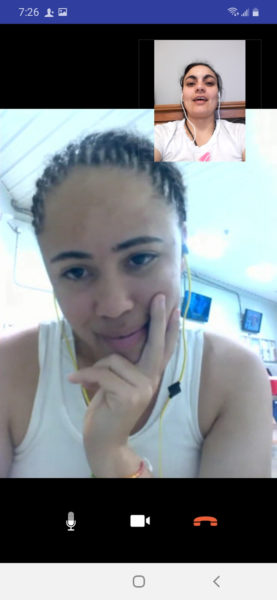
Doubossarskaia confirms the detention center in which Moreno lives now has room to promote social distancing, but staff have chosen not to enforce it.
Moreno told the Blade a group of female detainees from different housing units were transferred to her dorm in early May. Moreno said an officer at the detention center said it was to make “better use of space” when someone asked about it.
There were 871 ICE detainees with confirmed coronavirus cases as of deadline. ICE’s website says 7,364 of the 24,713 people who were still in their custody have been tested for the virus.
ICE says it has evaluated its detained population based on the CDC’s guidance for people who may be at increased risk for serious illness as a result of the coronavirus. ICE has released more than 900 people from their custody after evaluating their immigration history, criminal record, potential threat to public safety, flight risk and national security concerns.
Despite the fact there are no confirmed coronavirus cases in her detention center, Moreno says she does not feel safe because the transfer of detainees into the facility has not stopped during the pandemic.
“Not all officers wear masks or gloves,” she said. “They say they do take precautions when they enter the center, but I am not sure. They are the ones that go in and out and do not protect us. We are required to be six feet away from each other and when we go to recreation or to the dining room there are only the detainees from one dorm. We do not mix with the others.”
Moreno also says she has experienced several instances of discrimination at the South Louisiana ICE Processing Center which the GEO Group, a Utah-based company operates, both at the hands of her fellow detainees and staff.
“I went to go to the bathroom twice and they told me that I couldn’t go in because they were sorry to bathe with me,” Moreno told the Blade. “I decided to bathe alone from that moment in order to avoid a problem. It has happened to me with the officers when I ask them, for example, for a paper and they don’t give it to me, but they give it to someone else who is behind me. I feel discriminated against because of things like that.”
Doubossarskaia said she believes ICE does not do enough to protect LGBTQ people at its facilities.
“We have heard many stories of detainees who suffer homophobia after their detention,” she said.
Moreno told the Blade that some of the officers at the South Louisiana ICE Processing Center “insult us, humiliate us.” Moreno also said she never thought she would have been “detained for so long.”
“In fact, my partner and I thought that it would be a maximum of two months and that we could go out, get married, make a life together, but none of this has happened,” she lamented. “We can only talk on the phone, but the separation is hard and very sad. I get depressed and cry a lot. “
The Blade asked what Moreno misses the most and without hesitation she said her freedom, and above all, her partner.
“I want to see her, embrace her …”, she says, followed by a long pause.
“I don’t feel like Yanelkys is well,” Rodríguez told the Blade. “In fact, we are seeking psychological help. She has already had two appointments with a professional because she is very stressed and I find her very downcast (…) and they (ICE) are not interested in her life.”
Michael K. Lavers contributed to this article.
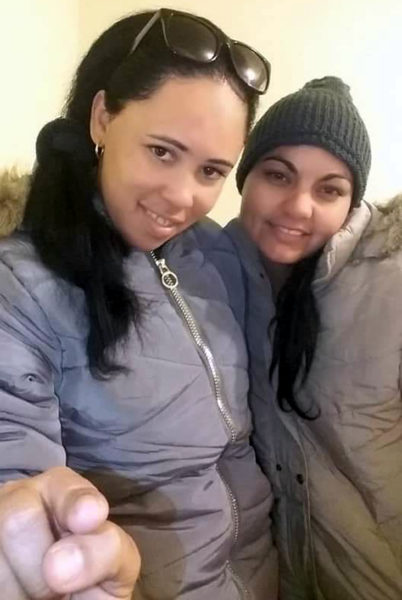
homepage news
Honoring the legacy of New Orleans’ 1973 UpStairs Lounge fire
Why the arson attack that killed 32 gay men still resonates 50 years later

On June 23 of last year, I held the microphone as a gay man in the New Orleans City Council Chamber and related a lost piece of queer history to the seven council members. I told this story to disabuse all New Orleanians of the notion that silence and accommodation, in the face of institutional and official failures, are a path to healing.
The story I related to them began on a typical Sunday night at a second-story bar on the fringe of New Orleans’ French Quarter in 1973, where working-class men would gather around a white baby grand piano and belt out the lyrics to a song that was the anthem of their hidden community, “United We Stand” by the Brotherhood of Man.
“United we stand,” the men would sing together, “divided we fall” — the words epitomizing the ethos of their beloved UpStairs Lounge bar, an egalitarian free space that served as a forerunner to today’s queer safe havens.
Around that piano in the 1970s Deep South, gays and lesbians, white and Black queens, Christians and non-Christians, and even early gender minorities could cast aside the racism, sexism, and homophobia of the times to find acceptance and companionship for a moment.
For regulars, the UpStairs Lounge was a miracle, a small pocket of acceptance in a broader world where their very identities were illegal.
On the Sunday night of June 24, 1973, their voices were silenced in a murderous act of arson that claimed 32 lives and still stands as the deadliest fire in New Orleans history — and the worst mass killing of gays in 20th century America.
As 13 fire companies struggled to douse the inferno, police refused to question the chief suspect, even though gay witnesses identified and brought the soot-covered man to officers idly standing by. This suspect, an internally conflicted gay-for-pay sex worker named Rodger Dale Nunez, had been ejected from the UpStairs Lounge screaming the word “burn” minutes before, but New Orleans police rebuffed the testimony of fire survivors on the street and allowed Nunez to disappear.
As the fire raged, police denigrated the deceased to reporters on the street: “Some thieves hung out there, and you know this was a queer bar.”
For days afterward, the carnage met with official silence. With no local gay political leaders willing to step forward, national Gay Liberation-era figures like Rev. Troy Perry of the Metropolitan Community Church flew in to “help our bereaved brothers and sisters” — and shatter officialdom’s code of silence.
Perry broke local taboos by holding a press conference as an openly gay man. “It’s high time that you people, in New Orleans, Louisiana, got the message and joined the rest of the Union,” Perry said.
Two days later, on June 26, 1973, as families hesitated to step forward to identify their kin in the morgue, UpStairs Lounge owner Phil Esteve stood in his badly charred bar, the air still foul with death. He rebuffed attempts by Perry to turn the fire into a call for visibility and progress for homosexuals.
“This fire had very little to do with the gay movement or with anything gay,” Esteve told a reporter from The Philadelphia Inquirer. “I do not want my bar or this tragedy to be used to further any of their causes.”
Conspicuously, no photos of Esteve appeared in coverage of the UpStairs Lounge fire or its aftermath — and the bar owner also remained silent as he witnessed police looting the ashes of his business.
“Phil said the cash register, juke box, cigarette machine and some wallets had money removed,” recounted Esteve’s friend Bob McAnear, a former U.S. Customs officer. “Phil wouldn’t report it because, if he did, police would never allow him to operate a bar in New Orleans again.”
The next day, gay bar owners, incensed at declining gay bar traffic amid an atmosphere of anxiety, confronted Perry at a clandestine meeting. “How dare you hold your damn news conferences!” one business owner shouted.
Ignoring calls for gay self-censorship, Perry held a 250-person memorial for the fire victims the following Sunday, July 1, culminating in mourners defiantly marching out the front door of a French Quarter church into waiting news cameras. “Reverend Troy Perry awoke several sleeping giants, me being one of them,” recalled Charlene Schneider, a lesbian activist who walked out of that front door with Perry.

Esteve doubted the UpStairs Lounge story’s capacity to rouse gay political fervor. As the coroner buried four of his former patrons anonymously on the edge of town, Esteve quietly collected at least $25,000 in fire insurance proceeds. Less than a year later, he used the money to open another gay bar called the Post Office, where patrons of the UpStairs Lounge — some with visible burn scars — gathered but were discouraged from singing “United We Stand.”
New Orleans cops neglected to question the chief arson suspect and closed the investigation without answers in late August 1973. Gay elites in the city’s power structure began gaslighting the mourners who marched with Perry into the news cameras, casting suspicion on their memories and re-characterizing their moment of liberation as a stunt.
When a local gay journalist asked in April 1977, “Where are the gay activists in New Orleans?,” Esteve responded that there were none, because none were needed. “We don’t feel we’re discriminated against,” Esteve said. “New Orleans gays are different from gays anywhere else… Perhaps there is some correlation between the amount of gay activism in other cities and the degree of police harassment.”

An attitude of nihilism and disavowal descended upon the memory of the UpStairs Lounge victims, goaded by Esteve and fellow gay entrepreneurs who earned their keep via gay patrons drowning their sorrows each night instead of protesting the injustices that kept them drinking.
Into the 1980s, the story of the UpStairs Lounge all but vanished from conversation — with the exception of a few sanctuaries for gay political debate such as the local lesbian bar Charlene’s, run by the activist Charlene Schneider.
By 1988, the 15th anniversary of the fire, the UpStairs Lounge narrative comprised little more than a call for better fire codes and indoor sprinklers. UpStairs Lounge survivor Stewart Butler summed it up: “A tragedy that, as far as I know, no good came of.”
Finally, in 1991, at Stewart Butler and Charlene Schneider’s nudging, the UpStairs Lounge story became aligned with the crusade of liberated gays and lesbians seeking equal rights in Louisiana. The halls of power responded with intermittent progress. The New Orleans City Council, horrified by the story but not yet ready to take its look in the mirror, enacted an anti-discrimination ordinance protecting gays and lesbians in housing, employment, and public accommodations that Dec. 12 — more than 18 years after the fire.
“I believe the fire was the catalyst for the anger to bring us all to the table,” Schneider told The Times-Picayune, a tacit rebuke to Esteve’s strategy of silent accommodation. Even Esteve seemed to change his stance with time, granting a full interview with the first UpStairs Lounge scholar Johnny Townsend sometime around 1989.
Most of the figures in this historic tale are now deceased. What’s left is an enduring story that refused to go gently. The story now echoes around the world — a musical about the UpStairs Lounge fire recently played in Tokyo, translating the gay underworld of the 1973 French Quarter for Japanese audiences.
When I finished my presentation to the City Council last June, I looked up to see the seven council members in tears. Unanimously, they approved a resolution acknowledging the historic failures of city leaders in the wake of the UpStairs Lounge fire.
Council members personally apologized to UpStairs Lounge families and survivors seated in the chamber in a symbolic act that, though it could not bring back those who died, still mattered greatly to those whose pain had been denied, leaving them to grieve alone. At long last, official silence and indifference gave way to heartfelt words of healing.
The way Americans remember the past is an active, ongoing process. Our collective memory is malleable, but it matters because it speaks volumes about our maturity as a people, how we acknowledge the past’s influence in our lives, and how it shapes the examples we set for our youth. Do we grapple with difficult truths, or do we duck accountability by defaulting to nostalgia and bluster? Or worse, do we simply ignore the past until it fades into a black hole of ignorance and indifference?
I believe that a factual retelling of the UpStairs Lounge tragedy — and how, 50 years onward, it became known internationally — resonates beyond our current divides. It reminds queer and non-queer Americans that ignoring the past holds back the present, and that silence is no cure for what ails a participatory nation.
Silence isolates. Silence gaslights and shrouds. It preserves the power structures that scapegoat the disempowered.
Solidarity, on the other hand, unites. Solidarity illuminates a path forward together. Above all, solidarity transforms the downtrodden into a resounding chorus of citizens — in the spirit of voices who once gathered ‘round a white baby grand piano and sang, joyfully and loudly, “United We Stand.”

Robert W. Fieseler is a New Orleans-based journalist and the author of “Tinderbox: the Untold Story of the Up Stairs Lounge Fire and the Rise of Gay Liberation.”
homepage news
New Supreme Court term includes critical LGBTQ case with ‘terrifying’ consequences
Business owner seeks to decline services for same-sex weddings

The U.S. Supreme Court, after a decision overturning Roe v. Wade that still leaves many reeling, is starting a new term with justices slated to revisit the issue of LGBTQ rights.
In 303 Creative v. Elenis, the court will return to the issue of whether or not providers of custom-made goods can refuse service to LGBTQ customers on First Amendment grounds. In this case, the business owner is Lorie Smith, a website designer in Colorado who wants to opt out of providing her graphic design services for same-sex weddings despite the civil rights law in her state.
Jennifer Pizer, acting chief legal officer of Lambda Legal, said in an interview with the Blade, “it’s not too much to say an immeasurably huge amount is at stake” for LGBTQ people depending on the outcome of the case.
“This contrived idea that making custom goods, or offering a custom service, somehow tacitly conveys an endorsement of the person — if that were to be accepted, that would be a profound change in the law,” Pizer said. “And the stakes are very high because there are no practical, obvious, principled ways to limit that kind of an exception, and if the law isn’t clear in this regard, then the people who are at risk of experiencing discrimination have no security, no effective protection by having a non-discrimination laws, because at any moment, as one makes their way through the commercial marketplace, you don’t know whether a particular business person is going to refuse to serve you.”
The upcoming arguments and decision in the 303 Creative case mark a return to LGBTQ rights for the Supreme Court, which had no lawsuit to directly address the issue in its previous term, although many argued the Dobbs decision put LGBTQ rights in peril and threatened access to abortion for LGBTQ people.
And yet, the 303 Creative case is similar to other cases the Supreme Court has previously heard on the providers of services seeking the right to deny services based on First Amendment grounds, such as Masterpiece Cakeshop and Fulton v. City of Philadelphia. In both of those cases, however, the court issued narrow rulings on the facts of litigation, declining to issue sweeping rulings either upholding non-discrimination principles or First Amendment exemptions.
Pizer, who signed one of the friend-of-the-court briefs in opposition to 303 Creative, said the case is “similar in the goals” of the Masterpiece Cakeshop litigation on the basis they both seek exemptions to the same non-discrimination law that governs their business, the Colorado Anti-Discrimination Act, or CADA, and seek “to further the social and political argument that they should be free to refuse same-sex couples or LGBTQ people in particular.”
“So there’s the legal goal, and it connects to the social and political goals and in that sense, it’s the same as Masterpiece,” Pizer said. “And so there are multiple problems with it again, as a legal matter, but also as a social matter, because as with the religion argument, it flows from the idea that having something to do with us is endorsing us.”
One difference: the Masterpiece Cakeshop litigation stemmed from an act of refusal of service after owner, Jack Phillips, declined to make a custom-made wedding cake for a same-sex couple for their upcoming wedding. No act of discrimination in the past, however, is present in the 303 Creative case. The owner seeks to put on her website a disclaimer she won’t provide services for same-sex weddings, signaling an intent to discriminate against same-sex couples rather than having done so.
As such, expect issues of standing — whether or not either party is personally aggrieved and able bring to a lawsuit — to be hashed out in arguments as well as whether the litigation is ripe for review as justices consider the case. It’s not hard to see U.S. Chief Justice John Roberts, who has sought to lead the court to reach less sweeping decisions (sometimes successfully, and sometimes in the Dobbs case not successfully) to push for a decision along these lines.
Another key difference: The 303 Creative case hinges on the argument of freedom of speech as opposed to the two-fold argument of freedom of speech and freedom of religious exercise in the Masterpiece Cakeshop litigation. Although 303 Creative requested in its petition to the Supreme Court review of both issues of speech and religion, justices elected only to take up the issue of free speech in granting a writ of certiorari (or agreement to take up a case). Justices also declined to accept another question in the petition request of review of the 1990 precedent in Smith v. Employment Division, which concluded states can enforce neutral generally applicable laws on citizens with religious objections without violating the First Amendment.
Representing 303 Creative in the lawsuit is Alliance Defending Freedom, a law firm that has sought to undermine civil rights laws for LGBTQ people with litigation seeking exemptions based on the First Amendment, such as the Masterpiece Cakeshop case.
Kristen Waggoner, president of Alliance Defending Freedom, wrote in a Sept. 12 legal brief signed by her and other attorneys that a decision in favor of 303 Creative boils down to a clear-cut violation of the First Amendment.
“Colorado and the United States still contend that CADA only regulates sales transactions,” the brief says. “But their cases do not apply because they involve non-expressive activities: selling BBQ, firing employees, restricting school attendance, limiting club memberships, and providing room access. Colorado’s own cases agree that the government may not use public-accommodation laws to affect a commercial actor’s speech.”
Pizer, however, pushed back strongly on the idea a decision in favor of 303 Creative would be as focused as Alliance Defending Freedom purports it would be, arguing it could open the door to widespread discrimination against LGBTQ people.
“One way to put it is art tends to be in the eye of the beholder,” Pizer said. “Is something of a craft, or is it art? I feel like I’m channeling Lily Tomlin. Remember ‘soup and art’? We have had an understanding that whether something is beautiful or not is not the determining factor about whether something is protected as artistic expression. There’s a legal test that recognizes if this is speech, whose speech is it, whose message is it? Would anyone who was hearing the speech or seeing the message understand it to be the message of the customer or of the merchants or craftsmen or business person?”
Despite the implications in the case for LGBTQ rights, 303 Creative may have supporters among LGBTQ people who consider themselves proponents of free speech.
One joint friend-of-the-court brief before the Supreme Court, written by Dale Carpenter, a law professor at Southern Methodist University who’s written in favor of LGBTQ rights, and Eugene Volokh, a First Amendment legal scholar at the University of California, Los Angeles, argues the case is an opportunity to affirm the First Amendment applies to goods and services that are uniquely expressive.
“Distinguishing expressive from non-expressive products in some contexts might be hard, but the Tenth Circuit agreed that Smith’s product does not present a hard case,” the brief says. “Yet that court (and Colorado) declined to recognize any exemption for products constituting speech. The Tenth Circuit has effectively recognized a state interest in subjecting the creation of speech itself to antidiscrimination laws.”
Oral arguments in the case aren’t yet set, but may be announced soon. Set to defend the state of Colorado and enforcement of its non-discrimination law in the case is Colorado Solicitor General Eric Reuel Olson. Just this week, the U.S. Supreme Court announced it would grant the request to the U.S. solicitor general to present arguments before the justices on behalf of the Biden administration.
With a 6-3 conservative majority on the court that has recently scrapped the super-precedent guaranteeing the right to abortion, supporters of LGBTQ rights may think the outcome of the case is all but lost, especially amid widespread fears same-sex marriage would be next on the chopping block. After the U.S. Tenth Circuit Court of Appeals ruled against 303 Creative in the lawsuit, the simple action by the Supreme Court to grant review in the lawsuit suggests they are primed to issue a reversal and rule in favor of the company.
Pizer, acknowledging the call to action issued by LGBTQ groups in the aftermath of the Dobbs decision, conceded the current Supreme Court issuing the ruling in this case is “a terrifying prospect,” but cautioned the issue isn’t so much the makeup of the court but whether or not justices will continue down the path of abolishing case law.
“I think the question that we’re facing with respect to all of the cases or at least many of the cases that are in front of the court right now, is whether this court is going to continue on this radical sort of wrecking ball to the edifice of settled law and seemingly a goal of setting up whole new structures of what our basic legal principles are going to be. Are we going to have another term of that?” Pizer said. “And if so, that’s terrifying.”
homepage news
Kelley Robinson, a Black, queer woman, named president of Human Rights Campaign
Progressive activist a veteran of Planned Parenthood Action Fund

Kelley Robinson, a Black, queer woman and veteran of Planned Parenthood Action Fund, is to become the next president of the Human Rights Campaign, the nation’s leading LGBTQ group announced on Tuesday.
Robinson is set to become the ninth president of the Human Rights Campaign after having served as executive director of Planned Parenthood Action Fund and more than 12 years of experience as a leader in the progressive movement. She’ll be the first Black, queer woman to serve in that role.
“I’m honored and ready to lead HRC — and our more than three million member-advocates — as we continue working to achieve equality and liberation for all Lesbian, Gay, Bisexual, Transgender, and Queer people,” Robinson said. “This is a pivotal moment in our movement for equality for LGBTQ+ people. We, particularly our trans and BIPOC communities, are quite literally in the fight for our lives and facing unprecedented threats that seek to destroy us.”
The next Human Rights Campaign president is named as Democrats are performing well in polls in the mid-term elections after the U.S. Supreme Court overturned Roe v. Wade, leaving an opening for the LGBTQ group to play a key role amid fears LGBTQ rights are next on the chopping block.
“The overturning of Roe v. Wade reminds us we are just one Supreme Court decision away from losing fundamental freedoms including the freedom to marry, voting rights, and privacy,” Robinson said. “We are facing a generational opportunity to rise to these challenges and create real, sustainable change. I believe that working together this change is possible right now. This next chapter of the Human Rights Campaign is about getting to freedom and liberation without any exceptions — and today I am making a promise and commitment to carry this work forward.”
The Human Rights Campaign announces its next president after a nearly year-long search process after the board of directors terminated its former president Alphonso David when he was ensnared in the sexual misconduct scandal that led former New York Gov. Andrew Cuomo to resign. David has denied wrongdoing and filed a lawsuit against the LGBTQ group alleging racial discrimination.

-

 U.S. Supreme Court3 days ago
U.S. Supreme Court3 days agoSupreme Court to consider bans on trans athletes in school sports
-

 Out & About3 days ago
Out & About3 days agoCelebrate the Fourth of July the gay way!
-

 Virginia3 days ago
Virginia3 days agoVa. court allows conversion therapy despite law banning it
-

 Maryland5 days ago
Maryland5 days agoLGBTQ suicide prevention hotline option is going away. Here’s where else to go in Md.

